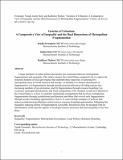Varieties of Urbanism: A Comparative View of Inequality and the Dual Dimensions of Metropolitan Fragmentation
Author(s)
Freemark, Yonah; Steil, Justin P; Thelen, Kathleen
DownloadAccepted version (584.5Kb)
Open Access Policy
Open Access Policy
Creative Commons Attribution-Noncommercial-Share Alike
Terms of use
Metadata
Show full item recordAbstract
A large literature on urban politics documents the connection between metropolitan fragmentation and inequality. This article situates the United States comparatively to explore the structural features of local governance that underpin this connection. Examining five metropolitan areas in North America and Europe, the article identifies two distinct dimensions of fragmentation: (a) fragmentation through jurisdictional proliferation (dividing regions into increasing numbers of governments) and (b) fragmentation through resource hoarding (via exclusion, municipal parochialism, and fiscal competition). This research reveals how distinctive the United States is in the ways it combines institutional arrangements that facilitate metropolitan fragmentation (through jurisdictional proliferation) and those that reward such fragmentation (through resource-hoarding opportunities). Non-US cases furnish examples of policies that reduce jurisdictional proliferation or remove resource-hoarding opportunities. Mitigating the inequality-inducing effects of fragmentation is possible, but policies must be designed with an identification of the specific aspects of local governance structures that fuel inequality in the first place.
Date issued
2020-02Department
Massachusetts Institute of Technology. Department of Urban Studies and PlanningJournal
Politics and Society
Publisher
SAGE Publications
Citation
Freemark, Yonah et al. "Varieties of Urbanism: A Comparative View of Inequality and the Dual Dimensions of Metropolitan Fragmentation." Politics and Society 48, 2 (February 2020): 235-274 © 2020 The Author(s)
Version: Author's final manuscript
ISSN
0032-3292
1552-7514